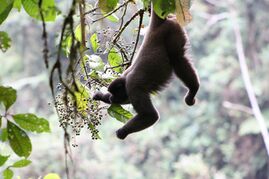Course:GEOS303
| Guidelines | Create Your Wiki Page | Past Projects | Help and Resources |
Welcome to the course wiki for GEOS 303: Tropical ecosystems in a changing world! Learning ecology is made more meaningful through the process of observing one place in depth, and coming to understand how the concepts you learn in class shape that place. In an ideal world, then, a tropical ecology course would include a field component, during which you would get the opportunity to get to know one tropical region in depth. Unfortunately, we’re stuck above the 49th parallel. So, the group project is your chance to get to acquainted more closely with one country/region, and to explore how the concepts and issues discussed in class apply in a country of your choosing. To do so, you will work with a group to create a wiki page for your region of interest which will address several of the key course themes in the context of your country/region. At the end of the term, you will choose one aspect of your findings to explore in more depth, creating a final product of your choosing. More information on this part of the project will be available at the end of term.
You will be choosing your groups during the third week of class. Once you have your groups, you can start working on your wiki page! To create your wiki page, click the "create your wiki page" tab above this text, and follow the instructions.
Please keep reading for some more detail on the project guidelines.
Project overview
With your group, you will chose one tropical country (or region) to explore in more depth. Throughout the term, you will take time to research and reflect on how the ecological, evolutionary, and social processes that we discuss in the course shape the region of your choosing. In particular, your wiki page will consist of the following topics (due dates indicated in parentheses):
- Climate and biomes: What are the dominant biomes and ecoregions in your country? What are their climatic and geographic characteristics? (Sep 29)
- Diversity: Describe patterns of biodiversity and endemism in your country. How have evolution and geography shaped these patterns? (Oct 20)
- Human influences: What role have humans historically played in shaping the ecology of the dominant ecosystems in your country? What has been the extent and nature of human influences on its ecology? Discuss the exposure to and observed or future impacts of threats to biodiversity in the context of your country. (Nov 10)
- Conservation: Each student should identify one conservation project in the region and analyze it within the context of course discussions – what is the rationale? What are the strategies being employed? Evaluate the program’s success to date in terms of conservation as well as social outcomes. (Dec 1)
Your wiki page should also include an introduction with a brief overview of your chosen country.
Guidelines
There is no minimum or maximum word count for each section. Rather, you should write as much as you need to address the topic, with a similar level of detail to what you might find in a typical Wikipedia article. As a rule of thumb, you might aim for 2-4 paragraphs for each section.
For each section of the wiki, you must reference at least 4-5 texts from the peer-reviewed scientific literature (one per group member).
The writing should be straightforward, succinct, and easy to understand. You are encouraged to incorporate photographs, maps, figures, etc. as long as they adhere to copyright guidelines. In general, any media you upload should be your own original work, or licensed for reuse via Creative Commons. More information on how to find and cite open resources for your wiki page can be found here.
All sources of information for your wiki must be cited. More information on how to cite sources in the wiki are found here.
Sharing Your Work
All wiki project pages are openly accessible on the Internet. If you would like to give permission for other people to use them (for example, by including them on the UBC Open Case Studies Site), the project template includes a green box that allows you to add your name(s) as author(s) of the resource and indicate if you'd like to share your work via a Creative Commons license . If you would like add a name for who or what project created the resource, add that info after the names parameters. If left blank, it will default to Course:GEO303.
The following is all optional but if you’d like your name added to the page as author as well allowing other people to re-use it as an ecology resource, you can:
- Click on the edit tab to edit your page
- Then scroll to the bottom and click on the green box at the bottom of the page
- This will generate a little pop-up with an edit button. Push the edit button.
- In the names field, add your name if you would like to be credited as the author
- In the share field, add “yes” (must be lowercase) if you would like to allow other folks to be able to reuse your page, such as by including it on the UBC open case studies site at http://cases.open.ubc.ca/. Clicking yes adds a creative commons license to the page.
